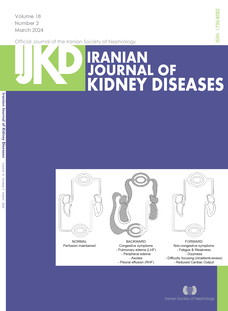Risk Factors and Clinical Characterization of Cardiovascularand Cerebrovascular Events in Elderly Hemodialysis Patients
DOI:
https://doi.org/10.52547/x7359962Abstract
Introduction. The purpose of this study was to assess the risk factors
and clinical characteristics of cardiovascular and cerebrovascular
events in elderly hemodialysis patients.
Methods. Elderly patients undergoing hemodialysis (HD) at
Deqing County People’s Hospital in Zhejiang, China, from May
2020 to May 2023 were enrolled in this study. They were divided
into two groups depending on the occurrence of cardiovascular
or cerebrovascular events: the case group and the control group.
Results. A total of 106 patients were enrolled in this study. Among
them, 49 patients experienced cardiovascular or cerebrovascular
events, resulting in an incidence rate of 46.23%. According to
whether cardiovascular or cerebrovascular events occurred, 57
patients were assigned to the control group, and 49 patients were
assigned to the case group. Comparing the basic information and
clinical indicators of the two groups, significant differences were
observed in patients with hypertensive nephropathy and diabetic
nephropathy (P < .05). There were also significant differences in
dialysis duration, smoking history, systolic and diastolic blood
pressures, uric acid, blood glucose, total cholesterol (TC), lowdensity
lipoprotein cholesterol (TG), C-reactive protein (CRP),
and PTH (parathyroid hormone) levels and platelet-to-lymphocyte
ratio (PLR), between the two groups (P < .05). Multivariate logistic
regression analysis revealed that longer dialysis duration, higher
systolic and diastolic blood pressures, elevated uric acid, TC, TG,
LDL-C, PTH, and blood glucose levels, smoking history, elevated
PLR, and CRP were independent risk factors for cardiovascular and
cerebrovascular events. The ROC curve showed that these risk factors
predicted cardiovascular and cerebrovascular events in patients.
Conclusion. Patients with underlying diseases such as hypertensive
or diabetic nephropathy are more likely to experience cardiovascular
and cerebrovascular events. Longer dialysis duration, higher systolic
and diastolic blood pressures, elevated uric acid, TC, TG, LDL-C,
PTH and blood glucose levels, and boosted inflammatory reaction
are risk factors for these events among elderly HD patients. The
purpose of this study is to provide practical guidelines for clinical
treatment. Comprehensive measures such as active intervention
of risk factors, rational drug use and regular examination should
be taken to improve the overall health level to the greatest extent
for elderly patients with high-risk HD.
DOI: 10.52547/ijkd.7877


